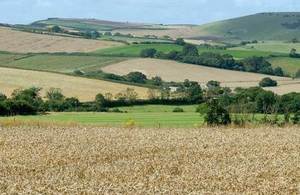Implementation of CAP announced
England's £15 billion Common Agricultural Policy funding will benefit farming, wildlife, rural businesses and the wider economy.

Implementation of CAP announced
Farming, wildlife, rural businesses and the wider economy in England are set to benefit from £15 billion from the next Common Agricultural Policy (CAP). Of this over £3 billion will be spent on improving the environment.
Today, Environment Secretary Owen Paterson has announced that the amount of funding transferred from farmers’ direct payments to the budget for environmental and rural growth schemes will be increased from 9% to 12%.
The demand for environmental schemes and the competiveness of English agriculture will be reviewed in 2016, with the intention of moving to a 15% transfer in the final two years of the CAP period.
Secretary of State for the Environment, Owen Paterson, said:
England’s £15 billion Common Agricultural Policy must deliver real benefits to farming, rural businesses, the countryside and the taxpayer.
Today’s decision will see £3.5 billion invested in the environment and rural development schemes over the next seven years.
This is a significant change in the way we allocate CAP money and even with a smaller overall CAP budget, the Government will be spending a bigger share of the budget on the environment than before.
During the EU negotiations, the UK pressed for every country to have the freedom to make choices about how it spends its funding. One of these choices is the option to transfer a proportion of the budget for farmers’ direct payments into the rural development budget. As a result of this transfer, environmental schemes will get a higher proportion of the CAP budget than they do now, while ensuring that English farming remains competitive.
England’s hill farmers will also be helped by today’s announcement. For the first time ever, they will receive the same direct payment rate on their upland farmland as their lowland counterparts. This will support farmers working in some of the toughest conditions and least-productive land, who manage some of our most beautiful countryside and provide habitats for wildlife. This helps to sustain our £33 billion a year tourism industry.
The work of farmers and landowners through environmental stewardship programmes has already created lasting habitats for rare birds and pollinators boosting rural tourism by improving the natural environment.
Rural business schemes have already successfully transformed the prospects of thousands of businesses and farms, created 8,500 rural jobs across the country, safeguarding another 9,700.
Within a smaller overall CAP budget these decisions will help to grow the rural economy and improve the environment.